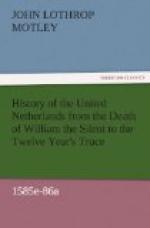But still the negociation between Holland and England was a strange one. Holland wished to give herself entirely, and England feared to accept. Elizabeth, in place of sovereignty, wanted mortgages; while Holland was afraid to give a part, although offering the whole. There was no great inequality between the two countries. Both were instinctively conscious, perhaps, of standing on the edge of a vast expansion. Both felt that they were about to stretch their wings suddenly for a flight over the whole earth. Yet each was a very inferior power, in comparison with the great empires of the past or those which then existed.
It is difficult, without a strong effort of the imagination, to reduce the English empire to the slender proportions which belonged to her in the days of Elizabeth. That epoch was full of light and life. The constellations which have for centuries been shining in the English firmament were then human creatures walking English earth. The captains, statesmen, corsairs, merchant-adventurers, poets, dramatists, the great Queen herself, the Cecils, Raleigh, Walsingham, Drake, Hawkins, Gilbert, Howard, Willoughby, the Norrises, Essex, Leicester, Sidney, Spenser, Shakspeare and the lesser but brilliant lights which surrounded him; such were the men who lifted England upon an elevation to which she was not yet entitled by her material grandeur. At last she had done with Rome, and her expansion dated from that moment.
Holland and England, by the very condition of their existence, were sworn foes to Philip. Elizabeth stood excommunicated of the Pope. There was hardly a month in which intelligence was not sent by English agents out of the Netherlands and France, that assassins, hired by Philip, were making their way to England to attempt the life of the Queen. The Netherlanders were rebels to the Spanish monarch, and they stood, one and all, under death-sentence by Rome. The alliance was inevitable and wholesome. Elizabeth was, however, consistently opposed to the




